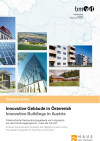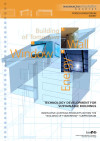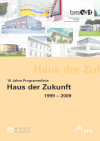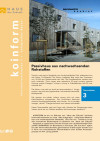Suchergebnisse
Seminar: PassivhausplanerIn und -beraterIn, Zertifikat
9. Jänner - 29. März 2014
Technische Universität Graz8010 Graz, AT
In österreichweit einzigartiger Kooperation von TU Graz, Kammer der ZiviltechnikerInnen für Steiermark und Kärnten, IG Passivhaus Plus, Bauakademie Steiermark und klima:aktiv wird umfassendes Wissen sowohl aus wissenschaftlicher als auch aus praxisorientierter Sicht vermittelt.
IEWT 2013: 8. Internationale Energiewirtschaftstagung
13. - 15. Februar 2013
TU Wien, Karlsplatz 13Wien, AT
Erneuerbare Energien: Überforderte Energiemärkte?
Lehrgang: Schimmelexperte - Spezialisierung "Vermeidung"
26. - 28. März 2014
Österreichisches Normungsinstitut, Heinestraße 381020 Wien, AT
Aufbauend auf dem Basiskurs "Schimmelsanierung" vermittelt dieser 3-tägige Spezialisierungslehrgang die zentralen Informationen zum Thema Schimmelvermeidung.
Info-Veranstaltung: Neue Standards für alte Häuser
28. Okt 2008
Stadtsaal-Restaurant, Nußallee 4
3430 Tulln, AT
Infoabend für Haus-Sanierende
Fachexkursion: Arealvernetzung durch Anergie-Netze
27. April 2012
ETH Zürich
Wallisellen, CH
Fachexkursion zu neuen Konzepten der effizienten Energieversorgung von Wohnquartieren und Gewerbegebieten
Innovative business models for integrated housing renovation
18. April 2012
Lindner Hotel City LoungeAntwerp, BE
The event is about innovative renovation of single family houses and integrated business models. It offers inspiration, knowledge, contacts in an active and interactive setting. The aim is to foster collaboration along the renovation business chains, leading to innovative integrated market concepts.
Broschüre: Innovative Gebäude in Österreich - Technical Guide

Österreichische Demonstrationsgebäude und Leitprojekte aus dem Forschungsprogramm "Haus der Zukunft"
Herausgeber: BMVIT
Mehrsprachig, 84 Seiten
Downloads zur Publikation
Einladung zum Richtfest der Holz- Passivhaus Wohnanlage Mühlweg
Im Beisein von Staatssekretär Mainoni wird die Wohnanlage mit 68 geförderten Mietwohnungen und zwei Wohneinheiten des SOS-Kinderdorfs geweiht.
Tagungsunterlagen: Österreichische Photovoltaik Fachtagung 2011
Alle Vortragsunterlagen der 9. Österreichische Photovoltaik Fachtagung vom 20. und 21. Oktober 2011 sind nun online verfügbar.
"Solar Decathlon 2013" erstmals mit österreichischer Beteiligung
Der "Solar Decathlon" ist ein vom US Department of Energy ausgelobter Wettbewerb im Bereich des solaren und nachhaltigen Bauens für Universitäten weltweit. Beim "Solar Decathlon 2013" wird erstmals ein Team der TU Wien - der Fakultät für Architektur und Raumplanung in Zusammenarbeit mit anderen Fakultäten - teilnehmen.
Nachhaltiges Bauen in Österreich - tatsächlich und nachweislich
Beim "Stadt der Zukunft"-Themenworkshop am 24. September 2015 im Plusenergiebürohochhaus der TU Wien werden das Weißbuch 2015 "Nachhaltiges Bauen in Österreich" und der Leitfaden "Monitoring von Plusenergie-Gebäuden" vorgestellt. Einige der untersuchten Demogebäude werden vor den Vorhang gebeten.
Alpenweiter Architekturpreis zu nachhaltigem Sanieren und Bauen
Der mit 50.000 Euro dotierte Preis "Constructive Alps" ist von der Schweizer Eidgenossenschaft ausgeschrieben. Ziel ist, das Bewusstsein von ArchitektInnen und BauherrInnen für verantwortungsvolles und zukunftsfähiges Sanieren und Bauen in den Alpen zu schärfen.
aspern Vienna´s Urban Lakeside - subproject 6a: Energy Consumption Monitoring
This subproject of the flagship project "aspern plus" derived the basis for a centralised monitoring of the energy consumption in Seestadt aspern.
SchulRen+ Innovative Konzepte für Schulsanierungen auf PlusEnergie-Niveau
Am Beispiel einer konkreten Schule (Franz Jonas Europaschule, Deublergasse, Wien 21) wurden in einer technischen Durchführbarkeitsstudie innovative Konzepte für Schulsanierungen auf Plus-Energie-Niveau untersucht. Ziel war es, Sanierungskonzepte zu entwickeln, die zukunftsweisende energetische Konzepte mit bautechnisch und architektonisch umsetzbaren Lösungen verbinden und ein hohes Replikationspotenzial für Gebäude gleichen Bautyps- und Baualters aufweisen.
Technology development for sustainable buildings

Innovative Austrian Products within the "Building of Tomorrow" Subprogram
Forschungsforum
3/2007
Herausgeber: BMVIT
Englisch, 6 Seiten
Downloads zur Publikation
Broschüre: 10 Jahre Programmlinie Haus der Zukunft (1999 - 2009)

Herausgeber: BMVIT
Deutsch, 32 Seiten
Downloads zur Publikation
Inhabitants-friendly passive house renovation in Klosterneuburg / Kierling

Renovation of an apartment house from the 1970s as passive house using renewable energy.
Marktpotenzial und Bekanntheitsgrad des Passivhauses in Österreich

Informationen über den Bekanntheitsgrad des Passivhauses und Vorstellungen über diese Technologie in der österreichischen Bevölkerung wurden erhoben und werden mit vorliegender Studie bereitgestellt.
ÖKOinFORM Folder 3 - Passivhaus aus nachwachsenden Rohstoffen

im Rahmen der Programmlinie Haus der Zukunft
J. Fechner, B. Lipp, R.Lechner
Herausgeber: BMVIT
Deutsch, 8 Seiten
Downloads zur Publikation
Demonstrationsvorhaben seniorenbezogene Konzepte in Neubau und Sanierung

Begleitung der Bau- und Besiedlungsphase der beiden als seniorenbezogene Bauvorhaben ausgeführten Projekte (Neubau und Sockelsanierung), Dokumentation und verallgemeinerbare Schlussfolgerungen
